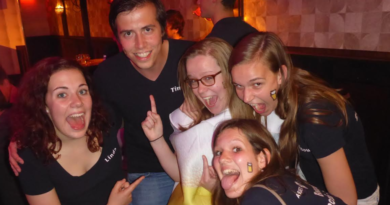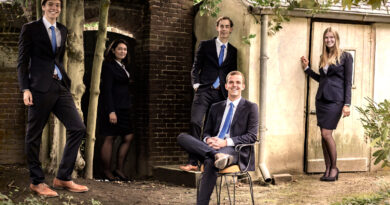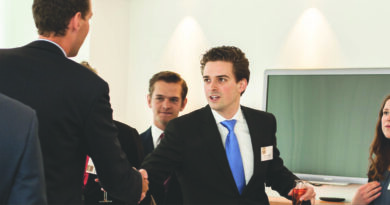Creating the New Leaders of Guatemala
The world has its own mysterious ways, and one cannot predict what happens after a master’s degree in econometrics. At least, it looks that way when we consider the career path of Tim Thijssen, an ex-board member of Asset | Econometrics, who chose to quit his job in favor of voluntary work. The destination was Central America, and the organization is called Niños de Guatemala. That probably raises some questions; this interview hopefully provides the answers.
Niños de Guatemala: what, where and why?
The story of Niños de Guatemala started in 2006, when its founder Marten Dresen was volunteering for an NGO (non-governmental organization) in Guatemala. He saw a lot of poverty and decided that he did not want to leave it at this single volunteering experience. When he returned to the Netherlands he immediately started fundraising. In 2009 the moment was finally there: with the help of his sister Annemiek and Sander Wirken, Niños’ had built their first school! Even though primary education is officially free and compulsory in Guatemala, students are required to buy uniforms and books, which many children cannot afford. Moreover, the parents of this particular group of children often want them to stay at home and work instead of going to school. When push comes to shove, many children are unable to enjoy the ‘free and compulsory’ education. Niños tries to address this issue in several ways. The organization currently has two primary schools in rural villages, and has recently opened a middle school. They actively search for children in the villages that need their help most, and allow them to join one of their schools. These are also the children that would otherwise be likely to just hang around on the streets and are least likely to go to a normal public school.
Tim: “Something I think is really cool, and public schools do not do, is that we actually go to the homes of the children when they do not show up at school, and make sure they come anyway.” As an extra incentive, children are given a free lunch at school and parents are allowed to take writing lessons and other courses once in a while. Also, the school works with social workers and has an own school psychologist: it is simply all very well organized. Tim: “Because parents recognize that their children can now read and write better than they can themselves, they can also see the benefits of sending them to school. Even more so, if their children can do simple arithmetic this can help them in their business as well.”

Ever since it started, the project has experienced impressive growth. Their schools currently teach a combined number of 400 children, to which 50 children (two classes of 25 children) are added each year. This has caused Niños to be well known in the area. These days, parents apply for their children at the school, hoping they get selected. Out of those applications, the organization selects the children they think need their help most. Niños hopes that their initiative prevents children from getting on the wrong path, and helps creating a good future for them. One could say that Niños’ goal is very ambitious: they want to create the new leaders of Guatemala. It is their strong belief that if they can send a couple of their children to university eventually, they have the opportunity to become successful and this will also benefit the organization in the future. Thus, currently, their first target is to find grants for the students in their middle school, to be able to send those to university.
Working for a good cause
Tim enters the story in 2014, when he moved to Guatemala for nine months. But how did this happen? After graduation, Tim worked at several consultancy firms, starting at OC&C. “I really liked the pure mathematics in the bachelor, but was already not very keen on its applications in the master program”. As such, even his first few jobs after graduation were not very closely related to econometrics. After having switched jobs a couple of times, he came to the conclusion that he did not like to work for the benefit of some unknown stakeholder and that he wanted to work for a cause. Therefore, he decided that it was now or never: he quit his job.
The original plan was to do relief work: working in the frontline in a warzone. Tim’s first point of focus were NGO’s such as the Red Cross, where he would like to work for one of their departments in Africa, or perhaps a country like Bangladesh. From the start it was clear though that it had to be somewhere abroad and for quite some time; after all, one does not quit his job for just a couple of weeks of volunteering. Via a colleague, Tim got in touch with Niños de Guatemala: “I heard that they had built two schools in a period of just eight years, and were teaching 350 children at that time. I was impressed with that and decided to completely let Africa go and focus on Guatemala.”
Latin America is very cool. You can have fun with the locals if you speak Spanish and it is simply a beautiful country
The intention was to work on a project that focused on moving several parts of the Dutch branch of the organization to the Guatemalan branch of the organization, and to organize and professionalize the communication, cash flows and requests for money. All of this was required because the organization had grown so fast in the last few years. In the end, this led to Tim becoming the organization’s de facto finance manager in Guatemala, a position that did not exist beforehand.
Heart of the Mayan world
“Latin America is very cool. You can have fun with the locals if you speak Spanish and it is simply a beautiful country. It is known as the heart of the Maya world; there are still some indigenous villages where the Maya culture is still very alive and the level of Spanish is not that high. Most of this culture centers around the Lake Atitlán, which is a beautiful lake. I could tell you that it is the largest sweet water reservoir in Central America after one in Nicaragua, but nobody is really interested in that. It is simply a beautiful lake.” Next to the natural beauty of the country, there are other reasons to choose Guatemala for such a project, one of them being the language. Tim: “I really wanted to learn Spanish, to better understand the country. An advantage of Guatemala is that Guatemalan Spanish has very little accent compared to neighboring countries, which helps to learn the language relatively fast. When I just arrived, I often just pronounced French words in a Spanish way, now I reverse this and pronounce Spanish words in a French way when trying to speak French.”

During his time in Guatemala Tim traveled a lot, both inside and outside of the Guatemalan borders. What struck Tim was the country’s extreme poverty. Due to the large income differences, the country does not have the lowest GDP per capita of the region, but in reality it is one of the poorest countries of Central America. According to Tim, this is partly due to inefficiency and corruption; through education, many problems can hopefully be (partly) solved. Niños is contributing its part, and if brand awareness is a good indicator, they are on the right track, as Tim indicates: “Whenever I just walked around in one of the villages, people immediately knew that I was part of Niños.” It is actually very well possible to experience this yourself as well; Tim mentions that Niños works with volunteers on a regular basis. Anyone between the ages of 18 and 99 is allowed to volunteer at the schools, be it for a period of at least one month, to teach e.g. English classes. This is not all though: it turns out that they have found many other ways to raise money and awareness.
The challenge
Niños is organizes the Experience Guatemala Challenge, of which the second edition will take place February 20 to 27, 2016. This challenge is best described as somewhere in between the Dutch TV-shows ‘Peking Express’ and ‘Wie is de Mol’. The ultimate goal is obviously to raise funds for Niños, to which end participants start with a fundraising campaign back home. After that, they fly to Guatemala and participate in several challenges in a race through Guatemala, in couples. Tim explains: “You get a challenge in the morning, something like: go to this location, while trying to use as little money as possible. Upon arrival, you get another challenge, most often either involving local people or physical work”. `Another type of challenge would be, for example, cooking a Guatemalan dish, and the couple that does this best gets rewarded the points. Tim knows what he is talking about, because he has participated in the challenge himself as well: “When I participated, I had just arrived in Guatemala and I liked the fact that the challenge makes you experience the country in a very different way. You get off the bus, and just act like normal Guatemalans do themselves: you either need do something or go somewhere instead of just looking around like a tourist does.”
The challenge is best described as somewhere in between the Dutch TV-shows ‘Peking Express’ and ‘Wie is de Mol’
While this way of fundraising sounds wonderful, Niños is working on other ways of gathering money as well. In the Netherlands, Niños participates every year with almost 200 people in the Dam tot Damloop in Amsterdam and they organize an annual charity event. Furthermore, Niños has partnered with the Good Hospitality Group in Amsterdam, which exploits the Good Hotel boat in Amsterdam. This hotel boat is scheduled to move to Rio de Janeiro in time for the 2016 Olympics, and will be replaced in Amsterdam by a new boat. The Good Hotel certainly lives up to its name: all profit is directed immediately to Niños and the employees are people who have a hard time finding a job. The hotel offers them an opportunity, and provides them with trainings and courses in e.g. English.
Back in Guatemala, effort is put into supporting the community as well. First of all, the Experience Guatemala Challenge is an entirely ‘Guatemalan’ project, not a Dutch one. Secondly, the schools themselves contribute in fundraising. Tim: “What I think is one of the nicest fundraisers, is the ‘kermesse’ (to be pronounced in a Spanish way) organized by the children and their parents. This is a sort of fair where the children and parents organize small games and activities on the school playground, and the people of the village come to visit the school and pay a small fee to participate in those small games. The community is very well aware that funds are required to run the school, and they are actively helping with this.”
Upon returning from Guatemala, Tim started working at War Child Holland. Tim: “I am happy in the position that I am in right now. It is really nice to work at an NGO full time, knowing that you help children, the group of people who should not be part of war under any circumstances.”
We would very much like to thank Tim for his time and interesting perspectives. For those of you who are interested in the foundation, you can visit their website www.ninosdeguatemala.org.
Text by: Stefan ten Eikelder





